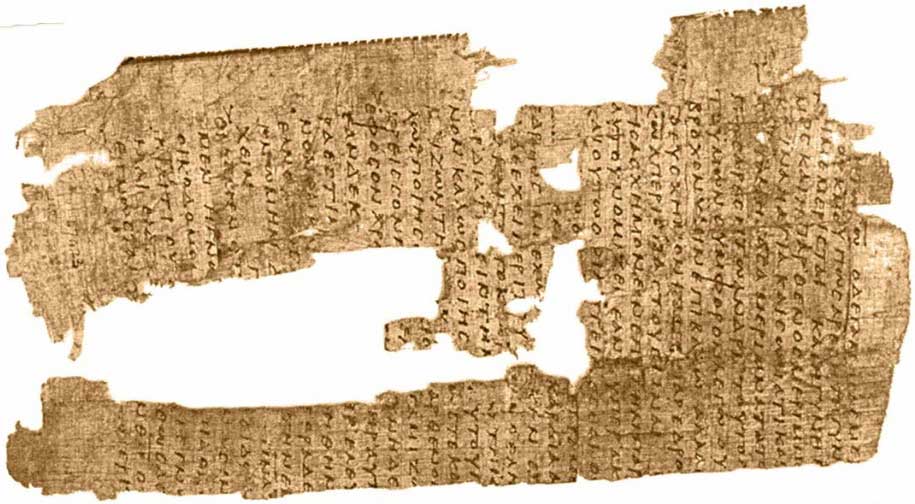I think that Christianity may have conflated Jesus's mystical experience of an ego death, perhaps at the time of his baptism when the "heavens opened," in which his individual psychological self "died" and he was was "reborn" of Spirit, or "raised up" (resurrected) to his identity in Christ consciousness (a consciousness of nondual union in God/Reality), with his biological death on the cross. These two deaths seem to have been conflated at some point, resulting in a supernatural conception of the resurrection.
Tag: ego death
Ephesians 1 BHT, "Paul" talks about the Grace of Christ in All Beings
An addition to the BHT, where Paul (or a disciple of Paul) talks about the infinite Grace that Christ is found in all beings, and the type of wondrous insight and knowledge that God reveals in those who attain the consciousness of Christ.
1 Thessalonians 1 BHT, Paul's First Words about the Word in the New Testament
An addition to the BHT, which may be the very earliest words written in the New Testament, around 50 AD, in Paul's letter to the family who are gathering in Thessaloniki. Paul is exuberant about their faith, and talks about how they knew it for themselves through the manifestation of the Spirit in themselves, after much suffering, just like Paul and Jesus. Their great example was quickly spreading abroad.
Is God a Male Human, or Two Males, or maybe Three? Do I hear Four? Or is it More?
Thinking of God as a male human(s) out in the universe somewhere seems to be a primitive, magical, supernatural, and archaic conception of the Divine, literalizing the pronouns of "He" and "Him," and in the Christian tradition of "Father" and "Son." I've written about this specifically at least once before, but it's worth discussing more.
1 Corinthians 15 BHT, Paul’s Earliest Witness of the Resurrection into Christ Consciousness, the “Gospel”
An addition to the BHT, containing the earliest account of the post-resurrection appearances of Christ in the New Testament, where Paul describes his witness of the resurrection and what it means to be resurrected into Christ consciousness. This seems to be an excellent summary of the Christian Gospel, or "good news," but it is something which I think we've generally misunderstood in Christianity for centuries. I feel that this is one of the most important translations of the BHT that I have been given the Grace to work out yet—yet not I. I was in tears by the end.
Is There a “Healthy” Ego?
In spirituality and mysticism we often encounter discussion about the ego, the psychological self, the "self" that we think we are. This is often referred to as a kind of illusion, something to rid ourselves of to see reality as it really is. It is called an obstruction, a veil, something which hides the Divine from us, which obscures our perception, and that it must be torn from top to bottom and done away. Sometimes mystics loudly loathe the ego, punish the ego, call for its death, its annihilation, its crucifixion, its extinguishment, extinction, falling away, passing away. This all sounds quite harsh to the "self" that we think we are, and so some spiritual teachers deny that we need to eradicate the ego, but rather transform it into something good. Which is it? Do we need to allow the ego to fall away, or transform it into a "healthy" ego? I'll share some of my thoughts about that.
Ego Dissolution or No Ego Dissolution?
There seems to be an ongoing discussion on the nature of the ego in mysticism and mystical transcendence. On the one hand, some say that the ego-self does not die, but is transformed. On the other hand, some say that ego-self does die, and something else emerges in its place. Which is more accurate? Or could they both have truth?
What Good is the Ego-Self?
Over the past several months I've explored the nature of the human ego as it relates to spirituality in many of the major religious and spiritual traditions, as well as in science. As I noted in a series of posts, it seems that a recurrent theme throughout many of them is the idea of sacrificing ego, overcoming ego, transcending ego, even experiencing a kind of "death" of the ego, so as to realize the true nature of the self, of reality, and of God. We might ask then, what good is the ego? Is it all bad? Do we want to destroy our ego? Is that true spirituality?
What is the Spirit or Soul?
Many religious people believe that the spirit or soul is the ego-self, our personality, the person we think we are in our heads, our psychological "self," with all our memories and experiences and relationships, etc. But none of this existed at our birth.
Does Seeing God Cause Death to the Person?
Many ancient texts, including the Bible, note that seeing God brings death to the person. But then we also read of some who claim they saw God and lived to tell about it. What's going on? Which is it?









